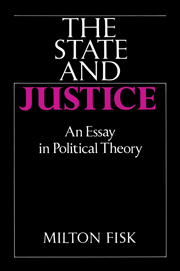Book contents
- Frontmatter
- Contents
- Preface
- Introduction: Can the state rule without justice?
- Part One An outline of a materialist political theory
- Part Two An assessment of the place of justice in the state
- 5 Ideal justice
- 6 Property and justice
- 7 Repression and radical justice
- 8 Justice and materialism
- 9 Equality and liberty
- 10 Class and the limits of control
- Part Three A functional view of political institutions
- Part Four An account of the community of states
- Part Five A reflection on the transition to a new kind of state
- Conclusion: State, class, and democracy
- Notes
- Index
7 - Repression and radical justice
Published online by Cambridge University Press: 06 July 2010
- Frontmatter
- Contents
- Preface
- Introduction: Can the state rule without justice?
- Part One An outline of a materialist political theory
- Part Two An assessment of the place of justice in the state
- 5 Ideal justice
- 6 Property and justice
- 7 Repression and radical justice
- 8 Justice and materialism
- 9 Equality and liberty
- 10 Class and the limits of control
- Part Three A functional view of political institutions
- Part Four An account of the community of states
- Part Five A reflection on the transition to a new kind of state
- Conclusion: State, class, and democracy
- Notes
- Index
Summary
“I've been a hundred percent American all my life, but now I feel the justice system needs some help.” This is how a strike leader summed up his experiences with the state toward the end of a seven-month-long strike by the Brotherhood of Railway Carmen against the Railcar Company in Washington, Indiana, in 1980. Police harassed strikers not just on the picket line but throughout the town; 30 of the 362 strikers were arrested. Another striker described the southern Indiana town of twelve thousand as “nothing but a kangaroo court aimed at the strikers.” An administrative law judge for the National Labor Relations Board listened to the company's charges about union violence, but there was no place for responses from the union. In addition, strikers were outraged at the money the city was spending to protect and deliver scabs to the plant, scabs who proved unable to build the freight cars the company made. The strike was about the differential between the carmen's five-dollar-an-hour wage in Washington and their nine-dollar-an-hour national average. With the aid of the state the Railcar Company forced the union to accept its derisory wage offer and then shortly thereafter closed its Washington plant down anyhow. “Labor trouble” was the reason Mayor Leo Sullivan gave for the fact that three major manufacturers left Washington in a decade.
- Type
- Chapter
- Information
- The State and JusticeAn Essay in Political Theory, pp. 92 - 103Publisher: Cambridge University PressPrint publication year: 1989



